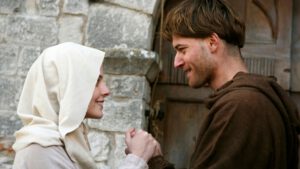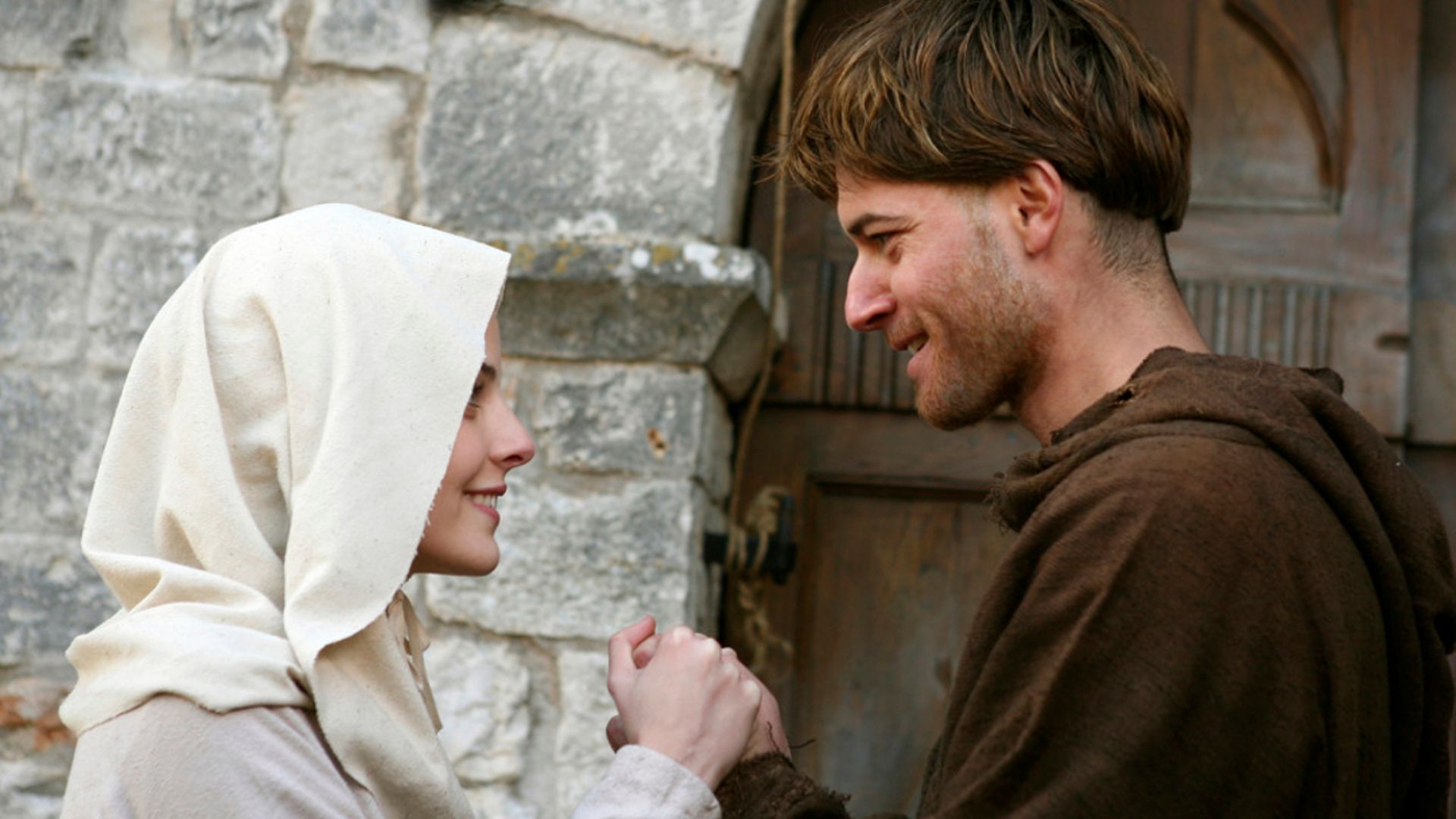Movie Info
Movie Info
- Director
- Fabrizio Costa
- Run Time
- 3 hours and 20 minutes
- Rating
- Not Rated
VP Content Ratings
- Violence
- 2/10
- Language
- 1/10
- Sex & Nudity
- 1/10
- Star Rating
Relevant Quotes
Jesus, looking at him, loved him and said, “You lack one thing; go, sell what you own, and give the money to the poor, and you will have treasure in heaven; then come, follow me.”
(Chiara e Francesco)

I just came across this DVD of an Italian TV production that is very suitable for celebrating the Feast Day of a man beloved by Protestants and Catholics, Francis of Assisi. The film clocks at 200 minutes—far longer than the others I have reviewed—Brother Sun, Sister Moon; Francesco; and Saint Francis of Assisi. That it is more inclusive you can see by the title, which gives equal billing to woman whose story is usually subordinated—indeed, it even comes first, Clare and Francis.
A lot of familiar beats are followed in this film—Francis growing up the privileged son of a wealthy cloth merchant, his dream of becoming a knight, going off to war and being taken prisoner, giving up the dream as he discovers the poor, the break with his father in the public square, the people’s ridicule of him and the eventual joining up of his friends as he rebuilds the ruined church St. Damiano, the persecution by enemies, his trip to Rome and audience with the pope after first being rejected—these are well dramatized often differently, and with a lot of additional material.
The film moves back and forth between the two saints, true to the intent of its title. To begin with, their families are shown to be on opposite sides of a class war in which Francis’s father Pietro di Bernardoni as a member of the lower class, has joined in a rebellion against the nobles of Assisi. Clare’s family is hastily packing and then fleeing as young Francis, clad in armor purchased by his father, is joining in the pursuit of the noble. He stops when young Clare drops her doll and gives it to her. I suspect this first meeting is more of a romantic touch than historical. Curiously, when later, Francis sets off to war and is imprisoned for a while, he does not become seriously ill, as in Zeffirelli’s version. Nor upon his being ransomed, does he sink into a period of madness, though he does renounce his dream of knighthood. While he is a prisoner Clare is shown with a basket of bread visiting the prison, her encounter with the scoffing prisoner condemned to die especially affecting her.
Francis’ encounter with the leper beggar and the colony outside of Assisi is very moving, with his conversion by his call, seeming from the painted crucifix in the little church outside Assisi, very effective. The replica used in the film actually looks like it had sat exposed to the elements for years, Francis having to wipe away the grease and dirt that at first obscures the features of Christ.
With his public break from his father, Francis is now notorious, with his former servant Illuminato (Gabrielle Cirilli) at first being his only companion—and at times hardly unwavering in his support. While the pair are undergoing ridicule and ostracism, Claire is being pushed into an unwanted marriage by the uncle who has become her guardian when her father dies. She sneaks out to join Francis and now his small band of followers, but he tells her that the wandering life is not for her. How she resists her uncle and eventually escapes to found her own order adds to the drama.
I am running out of time to meet this issue’s publication deadline, so am skipping over the familiar break with his father Pietro di Bernardone (Lando Bernardoni and the visit to Rome, tboth incidents emphasizing the gulf between Francis’ embracement of poverty and the established church’s pursuit of wealth. Zeffirelli’s gorgeous and highly romanticized Brother Sun, Sister Moon ends just after the papal approval of the Franciscan order, but in this film, we are but half-way through, with a great deal shown of the conflict among the friars over a written set of rules, Francis’ trip to Egypt and the Holy Land where he meets the Sultan in an attempt to stop the war between Christians and Muslims. Curiously, it is the Sultan who is open to reconciliation, but an arrogant cardinal who scuttles any idea of peace. On his way back to Italy there is a beautiful moment at Greccio where Francis gathers villagers and their animals to form the world’s first living creche so that Bethlehem could be experienced everywhere at Christmas. One of the saint’s legendary saint’s animal encounters is also included– the wolf of Gubbio—as well as his lingering illness that culminates in the stigmata. Interspersed are scenes from Clare’s life, including her sister and then her mother joining her order. The outraged uncle tries to seize them, but they manage to stay out of his grasp.
Actors Ettore Bassi and Maria P. Petruolo embody well history’s most famous, and beloved, pair of saints. Love and respect for one another, more than romance, is on display when they are together. The rest of the cast is excellent, too, with their fine acting enhanced by Marco Frisina’s musical score. Although not as lushly photographed as the Zeffirelli version, director Fabrizio Costa’s film gives us the most complete version of the life of the two saints. It is a treasure, readily available, new or used, at Amazon DVD. Other than a trip to Assisi itself—or perhaps volunteering at a soup kitchen or advocating for the poor—I can recommend no better way to honor this saint than to gather some friends together and watch this film.
This review will be in the Sept. issue of VP along with a set of questions for reflection and/or discussion. If you have found reviews on this site helpful, please consider purchasing a subscription or individual issue in The Store.

